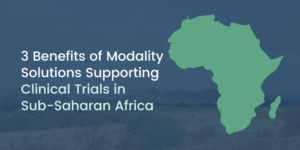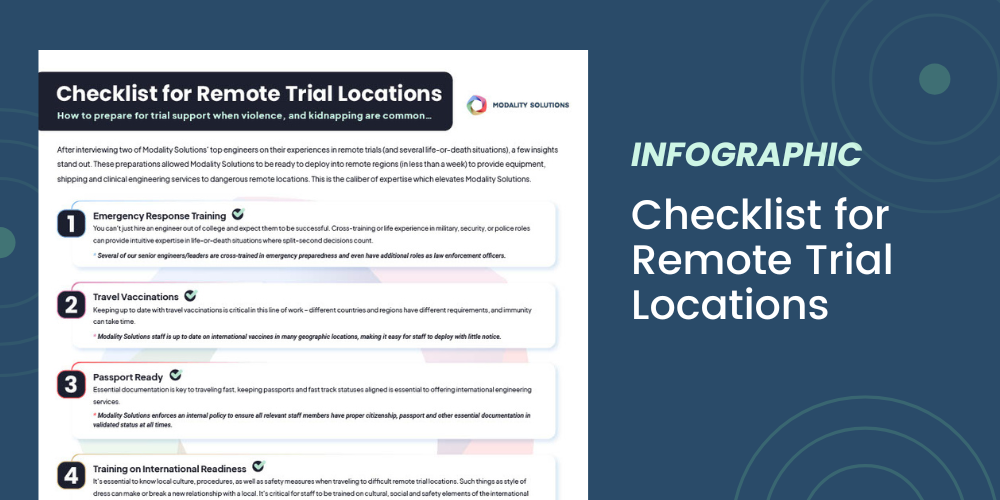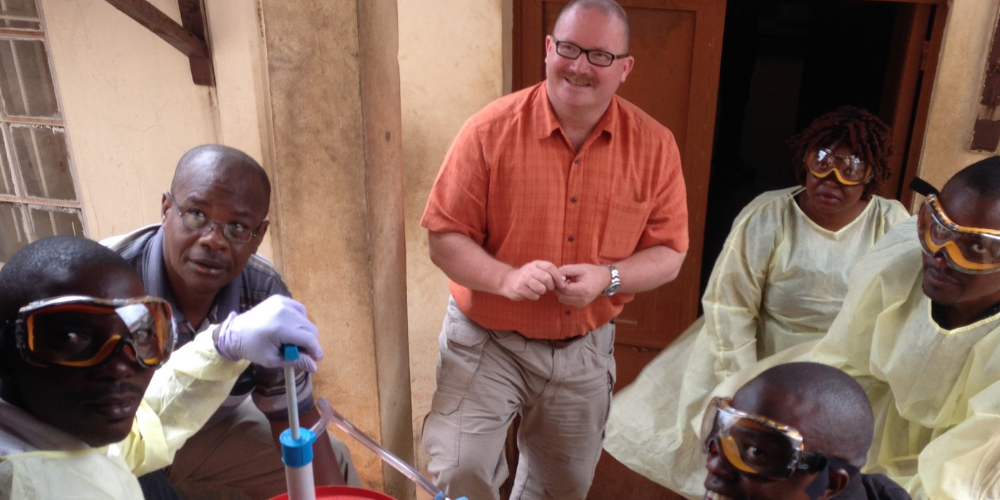5 Tips for Optimizing Your Clinical Trial Cold Chain in Challenging Regions
Download to discover 5 recommendations for clinical trial optimization in extreme environments.
read Details

Executive Summary:
Modality Solutions’ involvement in sub-Saharan clinical trials brings the additional value of local support, education, and positive trial perceptions – bringing clients elevated value in these regional areas.
Conducting clinical trials in remote locations poses additional vulnerabilities. A “Boots on the Ground” approach provides alignment with local resources, augmentation of training and preparedness, and an overall ‘elevated’ approach to the community, which builds a foundation for support of future trials. At Modality Solutions, our Boots on the Ground approach includes:
Around the globe, contract research organizations (CROs), government agencies, and non-governmental organizations (NGOs) conduct clinical trials to ensure patients have ready access to safe, effective vaccines and therapeutics. This critical humanitarian work often happens in challenging environments, like sub-Saharan Africa.
The equatorial climate brings intense hot and dry seasons followed by heavy rain seasons. Political turmoil often leads to civil unrest, with rebels attacking government buildings and facilities they perceive as working under the government’s direction, including healthcare sites. But while you might expect this region to pose significant operational obstacles, it may surprise you to learn that research sponsors and their partners have many positives on their side as they work to improve human health.
When sponsoring organizations conduct clinical trials in places like Liberia, the Democratic Republic of Congo (DRC), Sierra Leone, and other parts of Western Africa, they face difficulties inherent to the region. There is often a lack of basic infrastructure, such as well-maintained roads, consistent power, Internet connectivity, access to clean and fresh water, security, and emergency response personnel and equipment.
Even if you’ve never done healthcare work outside the US or visited sub-Saharan Africa, these facts probably won’t surprise you. But you might not know how many positives exist to support clinical trial work there or the cold chain it relies on. Modality Solutions is supported by these three realities in assessing, optimizing, and managing clinical trial cold chains in sub-Saharan Africa.
When a third party like Modality Solutions arrives on site to provide Cold Chain EngineeringTM support for clinical trials in sub-Saharan Africa, we’re not sure we’ll have reliable power or fresh water. We don’t take our safety for granted, but we’re confident we’ll work with skilled professionals ready to do their part to achieve a successful trial outcome.
Many of the tradespeople we encounter have spent years learning and refining their field of study and are eager to help protect much-needed, high-value drug products and patient samples. But they may not have training, experience, or knowledge about heat transfer, thermodynamics, or other factors that impact the pharmaceutical cold chain. By providing local tradespeople with cold chain-specific training on these critical subjects and preventive maintenance training, Modality Solutions finds waste is typically reduced (e.g., reducing the amount of damaged/discarded drug products or lost/unusable samples), and more robust compliance is achieved.
Challenging environments are also home to many well-educated, highly trained healthcare professionals dedicated to improving human health. Cold chain specialists like Modality Solutions leverage the in-country medical community’s deep commitment to clinical trial success and patient safety by cross-training them on infrastructure tasks they’re generally not trained for but are asked to take on in these unique environments.
For instance, it’s common for pharmacists and lab technicians to be expected to qualify and routinely monitor the performance of pharmaceutical-grade refrigerators and freezers used to store drug products and patient samples. Since that’s not their area of expertise, we develop standard operating procedures (SOPs) and provide cross-training on preventive maintenance and topics like heat transfer and thermodynamics to ensure they can effectively fulfill these additional duties. Because these healthcare professionals are committed to protecting the quality, integrity, and safety of the vaccines and therapeutics that can save lives in their local communities, they’re eager for these practical tools.
The local teams responsible for clinical trial operations may not inherently understand the complexities of the pharmaceutical cold chain—how they can contribute to ensuring the cold chain is up to the challenge of protecting temperature-sensitive drug products and samples.
That’s why clinical trial partners like Modality Solutions prioritize educating lab technicians and pharmacists, as well as maintenance, facilities, and other operational staff, about the vital role of the cold chain in conducting a successful clinical trial. For maintenance, facilities, and other operational staff, we focus on training on emergency response procedures (for example, what to do if a freezer temperature is too hot and in-alarm during the shift of the night security guard). We also train them to qualify refrigerators and freezers intended to store drugs and samples or the nuances of handling thermal packaging or placing temperature monitors in suitable locations for accurate readings. These teams gain greater awareness of all the components essential to a sound cold chain process.
As you might find in the US, patient sentiment toward vaccines can be a mixed bag in Western Africa. In our work on the Ebola virus outbreak in the DRC, for example, we’ve seen rebel groups spread propaganda accusing the government of using vaccines to insert microchips into people for tracking purposes, sowing the seeds of distrust.
Despite such obstacles, many patient populations are motivated to realize human health improvements. They are grateful for the clinical trial staff members who bring candidate vaccines and therapeutics to their communities.
The in-country staff supporting clinical trials are equally motivated and grateful for the help and support of research sponsors and their partner organizations. Even the ability to participate in formal training classes is an opportunity they value and welcome. And since much of our work is done on the ground, we form trusted relationships with the people conducting clinical trials under very trying circumstances.
As Modality Solutions Consulting Engineer Rachel Sawyer shared, “When I arrived for the first time in the DRC, the staff members at the clinical trial site were mostly speaking French, so I heard their words through a translator. Then I saw a pharmacy technician run up to Dan Littlefield (the company principal) to greet him and give him a big hug. It was clear they were happy to see our team again and appreciative of our work. A similar situation happened at a clinical trial site in Puerto Rico; Although no one on that team had previously been to San Juan, one of the support staff recognized “Modality Solutions” and gave us the nicest greetings.”
Modality Solutions partners with CROs, NGOs, and government agencies to augment their capabilities and help ensure the cold chain is equipped to withstand the rigors of clinical trials in sub-Saharan Africa and other complex environments. Contact us to learn how our Cold Chain EngineeringTM expertise can help ensure the success of your next clinical trial.
Download to discover 5 recommendations for clinical trial optimization in extreme environments.
read Details
How to prepare for remote trials when engineering knowledge isn’t enough. What sets our...
read Details
WRITTEN BY KIMBERLY BRUE AN INTERVIEW WITH DAN LITTLEFIELD, MODALITY SOLUTIONS Recently, I sat...
read Details